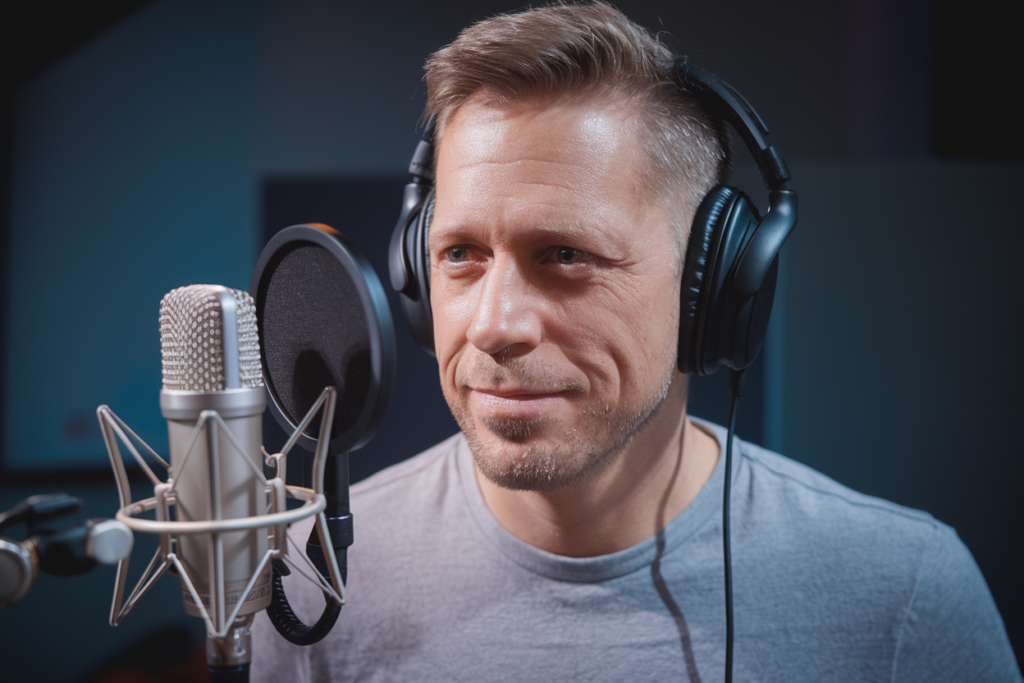Key Takeaways
- Cultural Nuances Matter: Understanding cultural differences is crucial, as humor and storytelling approaches vary significantly between German and English voiceovers.
- Language Precision: German voiceovers emphasize clear pronunciation and enunciation, while English voice artists often utilize varied tones influenced by regional accents.
- Emotional Delivery Variations: German voice actors typically adopt a straightforward delivery style focused on clarity, whereas English counterparts may incorporate emotional nuances to engage audiences.
- Growing Demand for Bilingual Talent: The influx of projects requiring both German and English voice talent has led to increased competition among local artists, encouraging bilingual skill development.
- Technical Skills are Essential: Voiceover artists must possess technical proficiency in recording equipment and sound editing to meet industry standards for quality audio production.
- Market Opportunities: With the rise of international media influence, there is a growing demand for high-quality English voiceovers in Germany, enhancing global appeal for local brands.
Ever wondered why German voiceovers sound so different from English ones? If you’re diving into the world of voiceover work in Germany, understanding these differences can make or break your project. From cultural nuances to linguistic subtleties, the way voices resonate varies significantly between the two languages.
Overview of Voiceovers in Germany
Voiceovers in Germany showcase a rich tapestry of culture and language, setting them apart from their English counterparts. You’ll find that the German voiceover landscape embraces distinct characteristics influenced by local preferences, accents, and emotional expressions.
German voice artists often prioritize clarity and precision. This emphasis ensures that the message resonates effectively with the audience. Tone and delivery play crucial roles; many voice actors adapt their styles to fit various contexts, whether for commercials, audiobooks, or corporate presentations. The ability to convey emotion authentically is vital for engaging listeners.
Cultural nuances also shape the way voiceovers are approached in Germany. For instance, humor may not translate directly from English to German due to differences in comedic styles. Thus, selecting the right voice over talent who understands these subtleties can enhance your project’s success.
When considering a voice over actor for your needs, it’s essential to evaluate their experience across different genres. Some specialize in educational content while others excel at dramatic performances or lighthearted advertising spots. Understanding these distinctions enables you to choose a suitable match for your specific project requirements.
Grasping the intricacies of German voiceovers helps you make informed decisions when selecting a talented artist capable of delivering compelling narratives tailored to your audience’s expectations.
Key Differences between German and English Voiceovers
Understanding the key differences between German and English voiceovers helps you choose the right voice talent for your project. Language nuances and cultural context play significant roles in these variations.
Language Nuances
Language nuances significantly affect how a voiceover sounds. In German, pronunciation tends to be more precise, with clear enunciation of every syllable. This clarity often reflects the broader cultural emphasis on structure and detail in Germany. English, on the other hand, has various accents and dialects that can change meaning or tone based on regional variations.
The use of intonation also differs. For instance, German voice actors may adopt a more straightforward delivery style, focusing on conveying information efficiently. Conversely, English voice artists might employ varied tones to convey emotion or humor more effectively. This difference impacts how audiences perceive messages across languages.
Cultural Context
Cultural context shapes not just language but also storytelling approaches in voiceovers. In Germany, humor is often subtle and less overt than in many English-speaking cultures. Therefore, selecting a voice actor familiar with these cultural subtleties enhances the effectiveness of your message.
Moreover, Germans appreciate directness; they value authenticity over embellishment in advertising or narration. In contrast, many English-speaking audiences enjoy engaging narratives filled with personality and flair from their voice talent.
When choosing a voice over artist for projects intended for different markets, consider these cultural factors carefully to ensure your content resonates with its audience.
Popularity of Voiceover Work in Germany
Voiceover work in Germany enjoys significant popularity, driven by a thriving media landscape and a growing demand for diverse content. The market embraces both German and English voiceovers, catering to various sectors such as film, television, advertising, and e-learning.
Demand for English Voiceovers
The demand for English voiceovers continues to rise in Germany. With the increasing influence of international media, businesses often seek English-speaking voice talent to reach broader audiences. Companies recognize that using native-level English voice artists enhances their global appeal. Moreover, local brands aiming for international markets frequently require high-quality English voice overs to ensure clarity and engagement with non-German speakers.
Impact on Local Talent
The influx of projects requiring both German and English voice actors has considerably impacted local talent pools. Many aspiring voice artists are now focusing on bilingual capabilities or honing their skills specifically in one language. Consequently, this trend fosters competition among talents striving to stand out through unique vocal qualities or specialized genres like commercial or audiobook narration. As you evaluate potential candidates for your projects, consider how local talents adapt their delivery styles based on cultural nuances while maintaining the authenticity needed for impactful storytelling.
Challenges Faced by Voiceover Artists
Voiceover artists encounter several challenges that can impact their work and the overall quality of projects. Understanding these hurdles helps you appreciate the complexities of selecting the right voice talent for your needs.
Language Nuances
Language nuances pose significant challenges for voice actors. German voice artists prioritize precise pronunciation and clear enunciation, reflecting cultural values that emphasize structure. In contrast, English-speaking voice talent often navigates various accents and dialects, which can alter meaning or tone in subtle ways. You’ll want to consider how these differences affect the message delivery.
Cultural Context
Cultural context shapes how messages are received. German audiences prefer directness and authenticity, while English-speaking listeners may favor a more engaging narrative style filled with personality. This variance means understanding your audience is crucial when choosing a voice over artist who can adapt effectively to different styles.
Emotional Delivery
Emotional delivery varies widely between languages. German voice actors typically adopt a straightforward approach, focusing on clarity rather than emotional embellishments. Conversely, English voice artists might employ varied tones to evoke feelings or humor, adding layers to their performance. Selecting the right voice actor involves ensuring they can deliver emotion appropriately based on project requirements.
Technical Demands
Technical demands also challenge many in the industry. Voiceover recording requires high-quality equipment and knowledge of sound editing software for optimal results. Artists must be tech-savvy to produce professional-grade audio efficiently; lack of technical skills could hinder even talented performers from achieving desired outcomes.
Competition
Competition within Germany’s dynamic media landscape adds another layer of complexity for aspiring voiceover talent. With increasing demand for diverse content across film, television, advertising, and e-learning sectors, numerous artists vie for attention from clients like you seeking skilled professionals who stand out among their peers.
By recognizing these challenges faced by voice actors, you’re better equipped to evaluate potential candidates effectively and ensure successful collaborations that resonate with your target audience.
Conclusion
Understanding the differences between German and English voiceovers is key to ensuring your project’s success in Germany. By recognizing cultural nuances and linguistic subtleties, you can select the right talent who resonates with your target audience.
Emphasizing clarity and precision in German voiceovers contrasts with the varied tones often found in English delivery. This knowledge will empower you to make informed choices that align with your project’s goals.
As demand for diverse content continues to rise, being aware of these distinctions positions you ahead of the competition. Ultimately, appreciating these differences helps create compelling narratives that truly connect with listeners across languages and cultures.
Frequently Asked Questions
What are the main differences between German and English voiceovers?
German voiceovers emphasize clarity, precision, and straightforwardness, reflecting cultural values of structure. In contrast, English voiceovers often feature varied tones and accents to convey emotion or humor. These differences stem from linguistic nuances and cultural contexts that influence how each language is delivered.
Why is understanding cultural nuances important in voiceover projects?
Cultural nuances shape audience expectations and perceptions. In Germany, subtle humor and directness are valued, while English-speaking audiences prefer engaging narratives with personality. Understanding these subtleties helps in selecting the right voice talent for effective communication.
How does pronunciation differ between German and English voice artists?
German pronunciation is characterized by precise enunciation due to its cultural emphasis on detail. Conversely, English features various accents that can change meaning significantly. This makes careful selection of voice talent crucial depending on the project’s needs.
What challenges do voiceover artists face in Germany?
Voiceover artists in Germany encounter challenges such as navigating language nuances, meeting technical demands for high-quality recording, emotional delivery variations, and intense competition within a growing media landscape. Awareness of these obstacles can aid clients in selecting suitable candidates.
Why is there an increasing demand for English voiceovers in Germany?
As businesses aim to enhance their global appeal, there’s a rising need for native-level English talent to engage non-German speakers effectively. This trend reflects the expanding media landscape and the desire for diverse content across different sectors like film and advertising.
How should clients evaluate potential voice actors for their projects?
Clients should assess potential voice actors based on experience across genres relevant to their project requirements. Evaluating their understanding of linguistic subtleties and cultural contexts will ensure they select talent capable of delivering compelling narratives tailored to the audience’s expectations.







